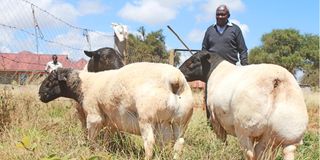Experts respond to issues affecting farmers

A farmer grazes his Dorper sheep in a farm in Kajiado County. This sheep breed is well-adapted to various climatic conditions, is hardy and resistant to parasites and diseases and has fast-growth rate.
What you need to know:
- Dorper sheep production is a viable business venture and when complemented with good husbandry practices, the return on investment is great as they mature faster compared to other breeds.
- The breed is well-adapted to various climatic conditions, is hardy and resistant to parasites and diseases and has fast-growth rate.
- Kamande seeds can be sourced from Kalro Seeds Unit ([email protected]), Simlaw Seeds Company ([email protected]), or any registered distributors, vetted by Kenya Plant Health Inspectorate Services (Kephis).
- Areas considered as dairy hubs with cows (mostly Friesian and Ayrshire breeds) of better ‘genetic potential’ and dairy characteristics include Githunguri in Kiambu, cooler parts of Nyandarua County, Trans Nzoia, Uasin Gishu and some areas of Nakuru County.
Beginner’s guide to quality sheep rearing
I am planning to put up a simple structure for 50 ewes. Water is a challenge, but I intend to purchase 10,000 litres plastic tank as I plan to construct a water pan inside the farm.
The breeding rams will be sourced from nearby Laikipia ranches. My market will be at auctions in Rumuruti and county governments interested in upgrading farmers’ sheep.
Walk me through the process of starting the project.
-Jepi
Dorper sheep production is a viable business venture and when complemented with good husbandry practices, the return on investment is great as they mature faster compared to other breeds.
The breed is well-adapted to various climatic conditions, is hardy and resistant to parasites and diseases and has fast-growth rate.
Furthermore, it is known for tender and delicious meat hence the high demand and popularity among consumers.
Your business idea sounds well-planned and ready to kick off, but remember good management is key to success.
Given the projected flock number and the breed’s suitability to natural pastures, you can adopt paddock grazing system on rotational basis to allow pasture regrowth, quality and avoid overgrazing.
It is also advisable to do supplementary feeding with grown forages of good quality and mineral salts for faster and healthy growth.
Addressing the water challenge is a good step in the right direction to ensure sufficient supply of clean water.
Where possible, consider underground tanks and other resource-efficient water harvesting and storage techniques on the farm.
Just like any other livestock, effective disease management routines such as vaccination, deworming and dipping among others must be observed.
I also encourage you to visit other ranchers for more practical skills and knowledge, in addition read online past articles published in Seeds of Gold on the topic.
Maureen N. Ogega, Department of Animal Science, Egerton University.
****
I need good ‘kamande’ seeds
I'd like to farm ‘kamande’, do you sell seeds? Please guide me on how to go about it.
-Joseph Mwanga
Lentils are commonly referred to as kamande by locals from Mt Kenya region. They belong to the leguminacea family.
This means that growing practices and growth trend is similar to the growth of the common bean. Agronomical practices and agro-ecological requirements are the same.
They also help in nutrient recycling since their roots bear nodules. They add essential vitamins, minerals, and fibre to the diet.
They are an excellent replacement for meat in meals since they contain high levels of protein and fibre. They come in different varieties, hence choose which one to grow among the brown, red and green varieties.
Kamande seeds can be sourced from Kalro Seeds Unit ([email protected]), Simlaw Seeds Company ([email protected]), or any registered distributors, vetted by Kenya Plant Health Inspectorate Services (Kephis).
Sillus Oduor
Department of Crop, Horticulture and Soils, Egerton University
****
Livestock farm
I saw some cows on Facebook and I am planning to venture into the business and also to keep sheep, chickens and goats.
I would like to know how much one costs and how can I get them?
-Arsene Mondo.
Based on field experience, livestock rearing is fairly capital intensive compared to crops. I advise that you narrow down to one or two species to intensify and commercialise, as you move one step at a time.
In this case, I deduce more interest in dairy farming. In this business, depending on your capital, one can invest with the objective to produce and sell milk or breed calves and heifers for sale or both.
It all starts with putting up a sound cow barn, stocking feed or fodder before sourcing for quality breeding stock.
Areas considered as dairy hubs with cows (mostly Friesian and Ayrshire breeds) of better ‘genetic potential’ and dairy characteristics include Githunguri in Kiambu, cooler parts of Nyandarua County, Trans Nzoia, Uasin Gishu and some areas of Nakuru County.
Be sure to be led by a veterinarian or livestock specialist when sourcing for cows. Those with clean records and registered with the Kenya Stud Book fetch from about Sh180,000 onwards.
This does not mean you cannot get good cows through unregistered farmers at lower prices. If this option sounds better, then obtain the first stock, make efforts to register as a foundation stock, and breed over subsequent years to pedigree cattle.
As for management, proper records, nutrition and disease control mechanisms should be adhered to.
-Felix Akatch Opinya, Department of Animal Science, Egerton University
****
Runner beans
I am interested in runner beans and herbs farming and would appreciate contacts of people in that field. I am in Ngorika, Mirangine, Nyandarua County.
-Joyce Nderitu
Agriculture has been devolved. Kindly visit the Ministry of Agriculture offices in Nyandarua County and they will give you names of farmers who are growing runner beans and herbs.
There is a farmer in Ndemi village who is growing runner beans for export, you can plan to visit her farm.
Carol Mutua
Department of Crops, Horticulture and Soils, Egerton University.





